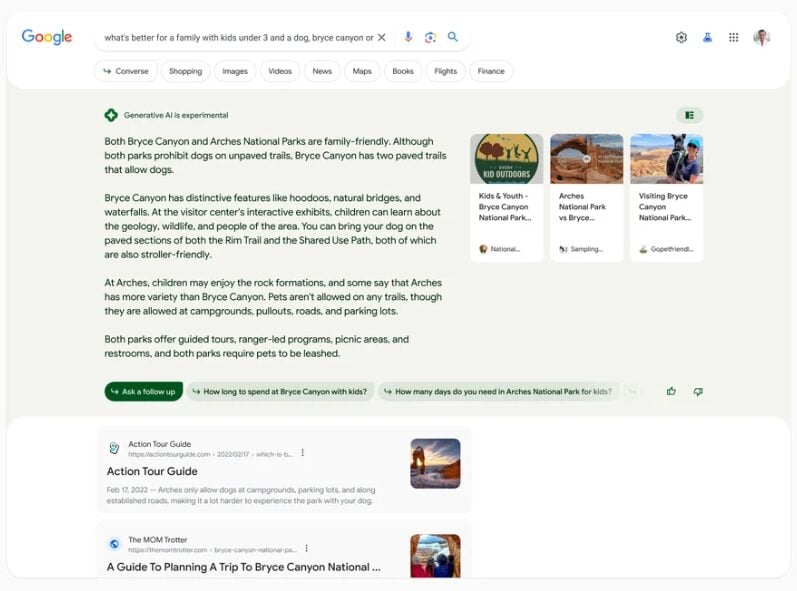2023 was one of the biggest years yet for the digital marketing industry. From algorithm updates that caused major disruptions to the SEO landscape to AI-generated content shaking the content marketing space – a lot has happened over the past 12 months. As such, there’s a need for digital marketing agencies to adapt and pivot as these changes are significant enough to disrupt their existing approaches.
So we’re likely to see new trends influencing the digital marketing agency world. In this post, we dive deep into the future of digital marketing agencies and what we can expect to see in 2024.
Adoption of AI Tools
With AI making great strides in the past few years, we’re also witnessing innovative AI marketing tools to automate tasks and improve the performance of digital marketing agencies. In addition to new AI-based tools popping up, many established digital marketing platforms are introducing AI capabilities to stay competitive. As a result, there will be an increasing adoption of AI tools among agencies to improve efficiency and get better results out of their digital marketing efforts.
In fact, WordStream’s State of the Digital Marketing Agency report found that ChatGPT made a prominent appearance in the list of tools used by digital marketing agencies. With 50% of agencies including it in their tech stack, it’s the second most popular tool next to Microsoft Excel. This gives evidence to the growing popularity of AI tools in the agency space and the value they bring to digital marketers.
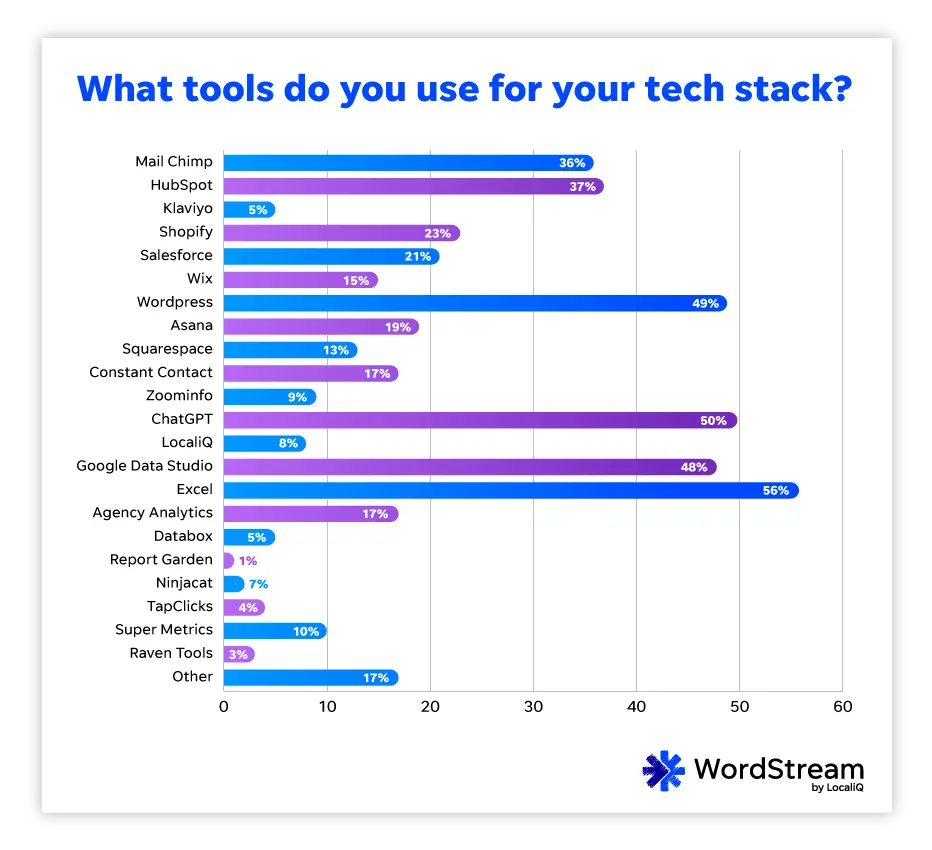
Tools you use for your tech stack
ChatGPT can help digital marketing agencies automate a number of activities including generating audience personas, conducting a SWOT analysis, and automating technical SEO. Additionally, they can use it to generate content for emails, pitch letters, social media posts, and many more.
But ChatGPT isn’t the only AI tool out there for digital marketers. There are several tools in the market that can help simplify content creation, post scheduling, caption writing, and analytics. For instance, Beacons AI generates high-quality content customized according to the tone of voice you want for your brand. Meanwhile, Flick comes with a feature to auto-suggest the most relevant hashtag for your post.
So the ability to save time will appeal to digital marketing agencies that are constantly striving to do more. This will lead to an even greater adoption of AI marketing tools than what we’re currently seeing.
Invest in more AI-based tools that will help you automate and optimize various digital marketing activities. Some of the tools in your existing tech stack might even be offering new AI-powered features that you can incorporate into your workflow.
Shift Towards AI-Based Offerings
Realizing the growing demand for AI in digital marketing, many agencies will go beyond simply using it in their own processes and also start to include it as a part of their offerings. You can already find many AI marketing agencies that originally offered only digital marketing services but later pivoted to build their own algorithms and offered AI-based services and tools.
For example, NeoReach offers advanced AI-based fraud detection services to optimize the influencer discovery and campaign monitoring processes. This tool is designed to help brands weed out inauthentic influencers with fake followers and fake engagements. All you need to do is provide the agency with the social profile or post URL you want analyzed and they’ll share a fraud detection report with you.
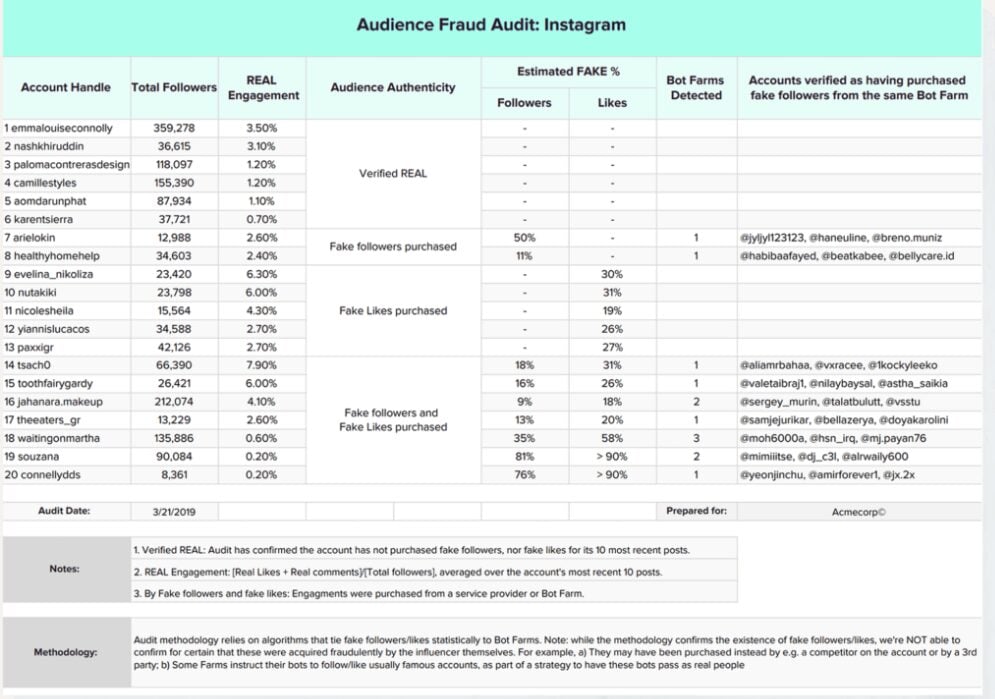
NeoReach fraud audit tool
Another example is Viral Nation’s selection of AI-powered solutions. Viral Nation_EmpowerTM, for instance, is an employee advocacy solution that comes with generative AI tools to bring your ideas to life. The solution uses AI to help with generating captions, producing videos, and more to ramp up employee-generated content and build a stronger connection with your audience.
The future of digital marketing agencies relies heavily on these types of AI-powered offerings to differentiate themselves from the competition. In most cases, the offering will be complementary to their existing services so that they can effectively address the unmet needs of their existing audience.
For example, in NeoReach’s case, since the agency mainly focuses on influencer marketing, an influencer fraud detection service is the perfect way to pivot, especially with the prevalence of fake influencers. Similarly, make sure to complement your existing service offerings with add-on services or tools that are centered on AI capabilities.
Evolution to Influencer Marketing 2.0
On the topic of influencers, influencer marketing will continue to evolve, forcing digital marketing agencies to shift their existing strategies. This isn’t just limited to the types of influencers they work with but also extends to other aspects of the influencer marketing process such as influencer identification and vetting. In line with the above trends, many of these changes will be related to AI.
For instance, our State of Influencer Marketing report found that 63% of respondents were planning to use AI in executing their influencer campaigns. Among these brands, two out of three will use AI in the influencer identification process. Other popular applications of AI include locating and distributing relevant content and identifying fake influencers and engagements.
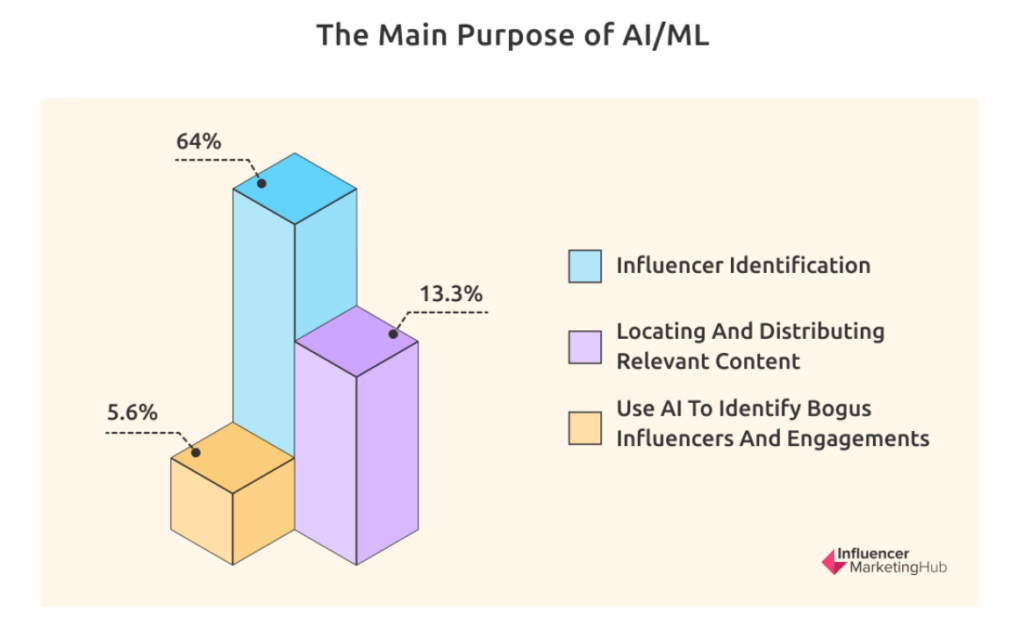
The main purpose of AI
So agencies that offer these capabilities will be highly favored by brands that want to take their influencer marketing efforts to the next level. As such, we can expect to see more and more brands improving their processes to include AI in many aspects of the campaign. They will leverage AI to speed up the process of identifying highly relevant influencers for brands. AI will also play a crucial role in influencer vetting as it can help to identify fake followers and engagements.
Beyond this, we’re also seeing a growing preference for smaller influencers in the past year, which will continue into 2024 and compel digital marketing agencies to review their influencer networks. While social media influencers with millions of followers took center stage a few years back, brands are starting to move away from these types of mega influencers. With a growing need to build authentic connections with their target audience, brands are beginning to focus more on nano-influencers and macro-influencers.
According to our State of Influencer Marketing report, nano-influencers (1K-10K followers) were the most preferred with 39% of brands choosing them. Micro-influencers (10K-100K followers) took second place with 30% of brands opting for them.
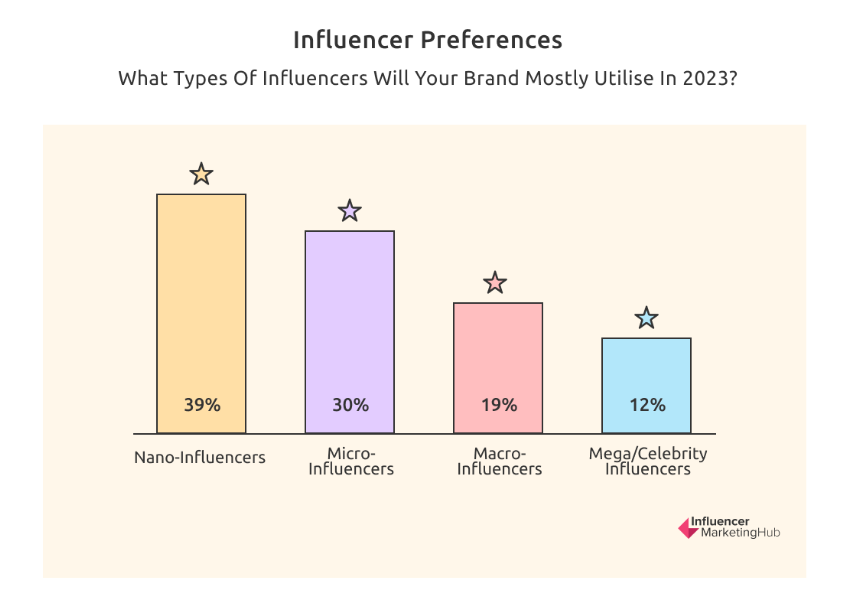
Influencer preferences
As a result of this, digital marketing agencies will start to prioritize their relationships with nano- and micro-influencers. This could mean reviewing their influencer networks and adjusting their requirements to allow more nano-influencers to sign up, for example. This doesn’t necessarily mean that digital marketing agencies will stop working with macro- and mega-influencers entirely. It just means that they’ll want to expand their networks to have more nano- and micro-influencer options for their clients.
Following this shift in preference among brands, you can already find agencies that are entirely dedicated to nano-influencers. For example, nano-influencer marketing agencies such as inBeat Agency have a network of 25,000+ nano-influencers in their network. These influencers help amplify brand presence through genuine content on social media channels. They can also generate review content to boost trust through third-party review sites like Google Shopping, Amazon, and Trustpilot.
Socially Powerful is another leading example of an agency that focuses heavily on nano-influencer marketing. In addition to leveraging organic influencer content, the agency carefully curates the top-performing posts and amplifies them through paid social campaigns. The agency reports that these ads coming from nano-influencer accounts have the potential to outperform brand-owned media by 7X.
Considering this, it’s important to evolve with this shift towards influencer marketing 2.0. Make sure the AI tools you’re investing in can also help with your influencer marketing campaigns. And if you’re not doing it already, expand your influencer network to focus on micro- and nano-influencers to provide your clients with options.
Going Hybrid with Pricing
It seems like changes are on the horizon in almost every aspect for digital marketing agencies. This extends far beyond their processes, tech stacks, and service offerings and even includes their pricing models. Hourly rates and flat fees are no longer the only way for agencies to price their services, with a growing number of agencies moving towards a hybrid model.
The WordStream survey from earlier found that a hybrid billing model has become the most popular, with 49% of agencies pricing their services using this model. Flat fees and retailers were the second most popular option with 24% following this model. According to the report, this is a sharp difference from a previous 2020 survey where flat fee and hybrid models were equally common.
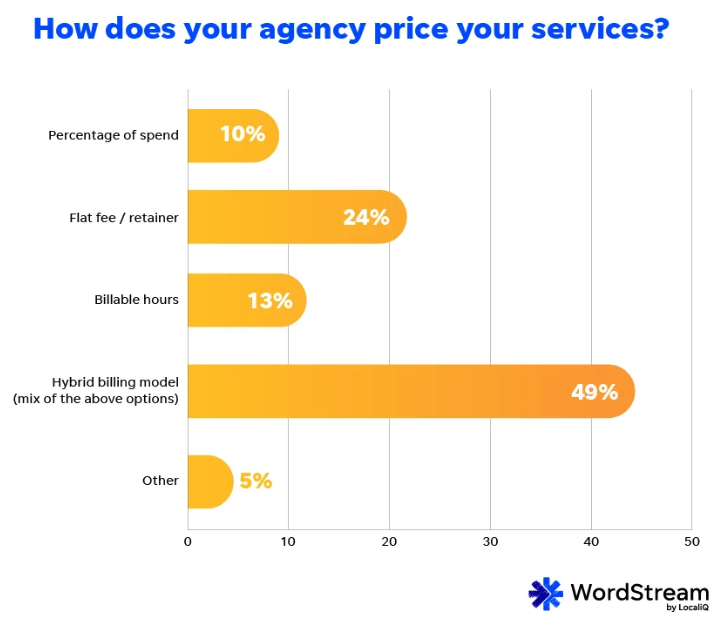
How does your agency price your services
We can expect to see a growing popularity of a hybrid approach to agency pricing as it offers more flexibility to agencies and clients alike. Being able to use a combination of flat fees, billable hours, and percentage of spend to bill their clients enables agencies to create mutually beneficial partnerships that don’t eat away at their bottom line.
One excellent example is the way WebFX prices their PPC management services. While they charge a flat fee for their Lite plan, they use a hybrid model for the Pro plan and Enterprise plan. They charge a flat fee for initial optimization along with a percentage of ad spend for progressive monthly management.
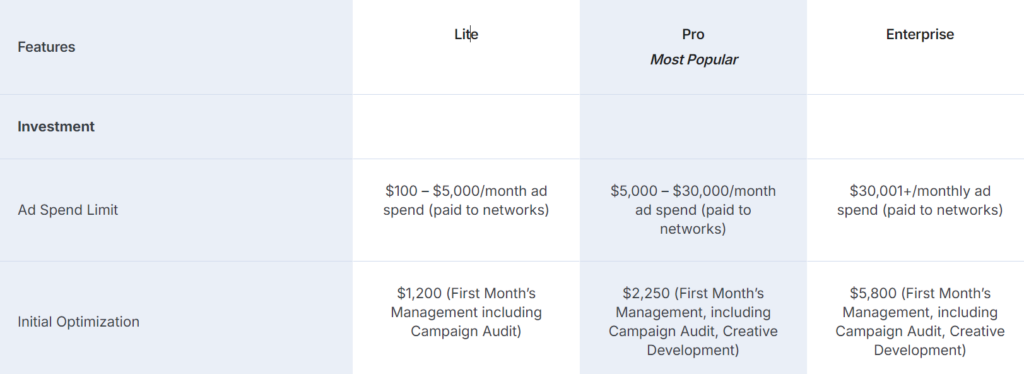
WebFX prices
That’s not to say that all digital marketing agencies will adopt a hybrid model. You can still find many SEO packages and social media packages offered at a flat rate. Some agencies even build customized packages with varying rates for each client.
However, a hybrid pricing strategy may be more beneficial depending on the type of digital marketing service and level of support you provide. This makes it crucial to reassess your current pricing strategy to see if it’s working for you or whether you need to make the move to a hybrid pricing model.
Upheaval of SEO Service Offerings
One of the most significant changes we’ll see in the near future is in terms of SEO service offerings. With Google constantly rolling out algorithm updates and introducing new elements to the search engine results page, the SEO landscape also needs to evolve. Following the trend of changes brought on by AI, we’re also seeing yet another major upheaval in SEO resulting from AI.
In May 2023, Google started experimenting with generative AI search, where users can get an AI-powered snapshot of key information related to their search. Called the Google Search Generative Experience (SGE), the goal of this experiment is to improve the search experience for users and allow them to access vital information more easily. The search engine will put together a few key points for relevant searches and position them at the top of the page along with links to dig deeper.
Users will also see suggested next steps and even have the option to ask more questions. For product-related searches, users will get a snapshot of key factors to consider along with products that fit the bill. Each product showcased will have a description and important information about reviews, ratings, and prices. This would eventually have an impact on click-through rates as users won’t have to scroll too far to find the information they need.
Although the initial rollout is only for the U.S., we can expect SGE to cause major disruptions to search engine rankings and visibility overall. This makes it crucial for digital marketing agencies that provide SEO services to adapt their business model for Search Generative Experience Optimization.
At the time of writing this post, it’s too early to tell what SEO strategies will survive the age of SGE. However, since some of the AI-generated results provide link backs to the original content, which means that Google will still prioritize in-depth, high-quality content. As such, it’s important to keep up with existing strategies that focus on developing high-quality original content. Agencies will need to keep testing and optimizing to ensure that client rankings don’t get impacted too severely by this new update.
What’s Next for Your Digital Marketing Agency?
Based on what you can see so far, 2024 is going to be a big year for digital marketing agencies. With AI causing major disruptions to the landscape, this is the year you’ll need to heavily review everything from your existing processes and strategies to your business models and tech stacks and pivot accordingly.
Frequently Asked Questions
What is the future of digital marketing agencies?
The future of digital marketing agencies is AI. From tools to automate tasks to services that address client needs, digital marketing agencies will be adapting to a new landscape transformed by AI.
Will digital marketing survive in the future?
Digital marketing will survive in the future if backed by the right data and AI tools.
Will digital marketing be automated in the future?
Many aspects of digital marketing will be automated in the future with the rise of AI-powered marketing tools that can automate many aspects of digital marketing.
Is it worth starting a digital marketing agency in 2024?
Starting a digital marketing agency in 2024 can be worth it as long as you’re prepared to adapt to a new landscape transformed by AI.
What will digital marketing look like in 5 years?
In the next 5 years, digital marketing will heavily focus on AI, with the use of automation tools and AI-powered services.
